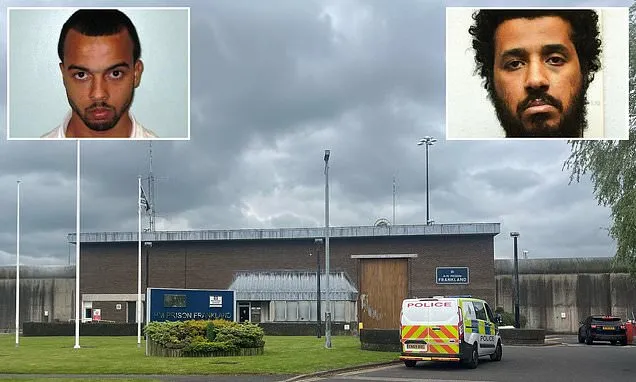Three 'Islamist' extremists have successfully argued being held in solitary confinement in prison is unlawful - because it makes them depressed, anxious and traumatised.
The Mail on Sunday can reveal the trio used the controversial European Convention of Human Rights (ECHR) to argue their cases at a cost of more than £500,000 to the taxpayer.
The true bill, including legal aid and other court costs, is likely to be far higher as the men await enormous compensation payouts from the state.
Last night, critics demanded the Labour government withdraw from the European convention amid fears terror sympathisers were gaming the system.
Gangland murderer and 'extremist enforcer' Denny De Silva, 32, converted to Islam after he was jailed in 2016 but was put in a 'separation unit' after sharing Islamic State material with other convicts.
Fuad Awale, 37, who shot two men in the head in a planned 'execution', was isolated after taking a prison officer hostage and requesting to associate with one of the killers of Fusilier Lee Rigby behind bars.
And aspiring rapper Sahayb Abu, 31, who also goes by the name the 'Masked Menace', was sent to solitary confinement after guards feared he was attempting to radicalise other inmates.
All three of the men have successfully persuaded high court judges that keeping them separate from the general prison population is unlawful under ECHR rules.
Shadow justice secretary Robert Jenrick branded the rulings 'insane' and said: 'Not a single penny of taxpayer's money should be going to these evil men.
'Lammy must bring forward emergency legislation and leave the ECHR so this doesn't happen, and we can keep the most dangerous prisoners in isolation.
'If he doesn't, more and more murderers and terrorists will abuse the law at the British people's expense.'
The Labour government admitted the staggering costs of the legal challenges brought by the three men in response to a request for information by Mr Jenrick, seen by this newspaper.
He had asked how much public money legal challenges brought under the European laws by Silva and Awale had cost, and was told the figure came to £489,000 by a Ministry of Justice minister.
The cost of Abu's court hearings is yet to be calculated - and compensation payments for the trio could spiral into the tens of thousands.
Murderer Silva was first placed in a separation unit a year after arriving at HMP Full Sutton, East Yorkshire, after he was found to have shared Islamic State material with other convicts.
In January, he argued at the High Court, with financial backing from the public purse, that limiting his access to the gym and the library contravened his right to a private life enshrined in the ECHR.
He also said that separating him from other prisoners made him feel anxious. His challenge was accepted by Mrs Justice Hill.
Meanwhile, Awale, who was jailed for a minimum of 38 years after he shot two men in the head in 2011, was isolated from other prisoners after he attempted to take a guard hostage in 2013.
Awale was also said to have requested to make contact behind bars with Islamic extremists Michael Adebolajo and Michael Adebowale, who killed Lee Rigby in Woolwich that same year.
He was placed in supervision at HMP Manchester, but became 'depressed' and punched a prison officer in the face. He has been held at HMP Woodhill in Milton Keynes since 2021 and was in solitary since March 2023.
Last year, judge Mrs Justice Ellenbogan concluded that Awale’s rights under Article 8 of the European Convention on Human Rights had been breached.
And Abu, whose case was heard last week, was jailed for a minimum of 19 years for planning a knife rampage during the pandemic.
The fanatic bought an 18-inch sword and body armour online while calling himself the 'masked menace' and writing a rap song in which he admitted he was a 'straight Isis supporter'.
He was segregated in HMP Frankland last April to prevent him spreading extremist beliefs after fellow inmate Hashem Abedi, the brother of the Manchester arena suicide bomber, is said to have attacked several prison officers.
Abu was transferred to HMP Woodhill segregation unit where he claimed he suffered 'panic attacks, suicidal thoughts and acts of self-harm'.
On Tuesday, Mr Justuce Sheldon ruled in Abu's favour. 'Separation units' were created in 2017 by the Conservatives to tackle extremism in prisons.
There are only three separation units made up of 28 cells found in HMP Frankland, Full Sutton and Woodhill- Britain's toughest prisons.
During an 'urgent questions' session held in parliament last week, Labour MP and Ministry of Justice minister Alex Davies Jones said the government is considering appealing the case of Abu.
A Government spokesman said: 'We won't be cowed by legal threats from prisoners. When dangerous radicalisers pose a risk, they will be placed in separation centres.
'We are committed to the ECHR but its application is kept under review to ensure it is not acting as a barrier to us protecting national security.'
